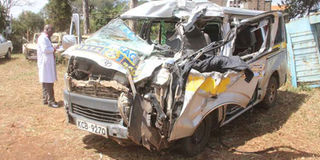Disband death machine that’s police traffic department

This photograph taken at Nyeri Central Police Station on September 30, 2016 shows the wreckage of a matatu that had been involved in a road accident in which one person died and six others were injured along the Nyeri-Karatina road the previous night. PHOTO | NICHOLAS KOMU | NATION MEDIA GROUP
What you need to know:
It makes much more sense, surely, to identify all the accident hotspots and have clearly marked speed guns on those roads so that motorists know that they will certainly be caught when speeding and not just when the police show up on their route.
- The time has come for radical solutions.
The numbers are staggering. In the last 10 years, 34,020 people have lost their lives on Kenyan roads.
Every year since 2008, there have been at least 3,000 fatalities, with the numbers dipping slightly under that figure to 2,907 in 2014 and hitting an all-time record of 4,032 deaths in 2009. That’s without counting any of the lives lost in 2016.
Death through a road accident has a devastating impact on families. It is a sudden and abrupt way to leave the world.
The people that are constantly on the move are the most economically productive Kenyans. Many are breadwinners whose families are left brutally exposed to a life of hardship in a country with only a scant social safety net.
The tears of Kirianki M’Imanyara, mourning the death of his wife of two decades on TV this week after the latest outrageous accident on Lang’ata road put yet another face to the human cost of the carnage on the roads.
When will this madness end? Far more deaths have been recorded on Kenyan roads than the number of people that have died after terror attacks yet very little attention is paid to the task of stopping the needless loss of life from accidents.
There are multiple factors that contribute to the carnage. Bad attitudes among road users are a major contributor. Motorists routinely drive as though they are in a computer game where a crash will have no consequences, overtaking blind at corners, discarding lane discipline even in climbing zones and, particularly for lorries and buses, crawling along on the speeding lanes.
TRAFFIC POLICE
The ultimate blame, though, lies at the feet of the traffic police department. Just as Chinua Achebe remarked on corruption in his home country, that there was nothing wrong with Nigerians except that everyone knew that there would be no price to pay for graft (the same can be said of many other countries including Kenya), lawlessness rules on the road because there is no price to pay for it.
The roads are run by an extortionist, criminal cartel dressed in blue uniforms. Police officers wake up and head to work simply to make easy money. I have always marveled at the discipline with which this extortion takes place. The police are bound by a code of honour which would make the mafia proud.
When motorists are stopped for speeding on the Kericho-Kisumu road, for example, they will typically be told to go and speak to one of the policemen who will be on bribe taking duty.
The other officers will not know how much money has changed hands but they seem to have a trust pact with each other because they evidently amicably share the proceeds after work.
The worst thing is that this scandalous state of affairs has been normalised and completely accepted by society. To most Kenyans, graft in the traffic police department is a running joke.
The families of the thousands of people losing their lives and limbs every year don’t find it funny.
The time has come to take radical steps to end this mess. Bodies like the National Transport and Safety Authority are an unnecessary waste of taxpayers’ money and should be disbanded.
EFFECTIVE DEPARTMENT
What is needed is an effective traffic police department. Today, that department exists solely to profit from motorists.
Shock therapy must be applied. When he came to power in Georgia in 2008, the reformist 36-year-old President Mikheil Saakashvili signalled the need for change by sacking the entire traffic department and recruiting new officials to implement a new, digitised system of traffic violation fines.
In Kenya, it would be too risky to send the officers to the streets but they should all be re-assigned to other departments and fresh faces brought in.
The new traffic department should have an entirely different head brought in from outside the current top command of the police force and given specific targets for reducing rule-breaking on the roads.
The huge fines which Parliament introduced in a misguided effort to introduce deterrence should be revised downwards and the system of instant fines payable through mobile money should move from theory to practice.
Policing should be brought into the 21st century. Why do the police hide in bushes and on pedestrian bridges to enforce speed limits? Is their motive to trap motorists or to discourage speeding in the first place?
It makes much more sense, surely, to identify all the accident hotspots and have clearly marked speed guns on those roads so that motorists know that they will certainly be caught when speeding and not just when the police show up on their route.
Losing more than 30,000 lives within a decade should be entirely unacceptable in any society. The time has come for radical solutions.
[email protected]
@mutigam





